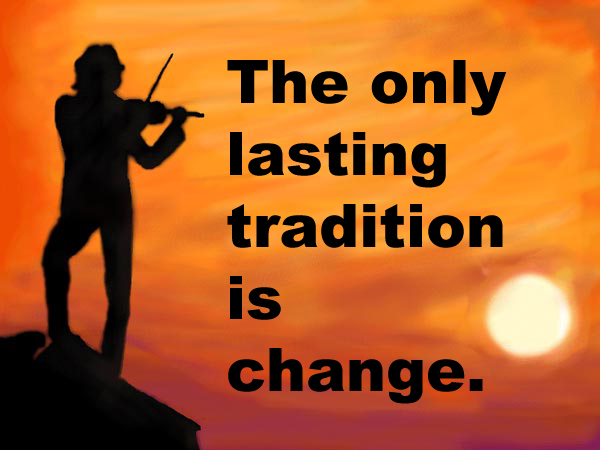Let's face it, by the time one becomes an adult learner many habits, biases, and perceptions have developed which could stall or motivate us in learning new and alternative ways of thinking. Chances are that the development of these learning habits were passed onto us by our individual learning mentors and environment. Based upon this thought, we are all products of an educational system filled with educational traditions. Tradition can be described as the transmission of an established way of thinking, feeling, or doing and is rooted in experience. Traditions are important to many people, organizations, and communities because they provide familiarity, security, and a way of doing things. Sometimes though, traditions paralyze us from exploring new experiences. Therefore, how do we determine which educational traditions serve our purpose and which ones inhibit us from moving forward? Educational leaders and instructors struggle with traditions and how to implement change.
Since experience is the process of personally undergoing, observing, or encountering something, educational traditions can be changed. How do we do that? According to Lewins' organizational change theory, there are three steps to implement change in learning (2014). First, one's previous learning must be unfrozen by introducing new information that reveals a discrepancy between past thinking and desired new thinking (2014). Secondly, the actual change in knowledge and thinking takes place and finally, the new learning is refrozen in the individual (2014). This process is similar to transformative learning in which a reflective experience and new knowledge emerges from questions about discrepancies between past and present situations. Flipping the classroom, gamification, and the utilization of current technology are some examples of changing traditional lecture learning to new engaging learning methods.
While I believe traditions provide familiarity and security for many instructors and students, we cannot accomplish a desired educational culture of self-directed, responsible, and engaged adult learners if we are not willing to create new traditions.
References:
Merriam, S.B. and Bierema, L.L. (2014). Adult
learning: Linking theory and practice.
San Francisco, CA: Jossey-Bass.


This blog post is a very interesting reflection on Experiential Learning. While usually experience helps us learn new things easier, and can therefore provide a good motivation for learning to take place, things can also go bad and therefore experience may not always be an aiding factor towards learning. Sometimes past experience can act as an inhibitor against acquiring new learning.
ReplyDeleteBesides bad past experience, tradition may also act as a resistor towards experimenting new ideas, and therefore as mentioned in (Merriam & Bierema, 2014) young adults may be more open minded to new ideas than older adults. To quote Claude Bernard: "It is what we know already that often prevents us from learning" (Brainy Quotes, 2015).
According to (Overcoming Learning Barriers, 2015) there are other barriers against learning (which in my opinions are all related to past experience!) such as: Doubts about success, Poor content, and Delivery beliefs. Our past experience gives us an image about how a content delivery should look like, or should not look like. A very authoritative instructor/parents may inhibit us on taking risks and trying new things unless we feel comfortable we will succeed, etc.
As one can see from above and from the original blog post, experience can act in favor or against acquiring new learning. In most cases, however, past experience facilitates and helps us understand new things and motivates us in learning new things.
References:
Brainy Quotes, http://www.brainyquote.com/quotes/quotes/c/claudebern177950.html, retrieved March 1st, 2015.
Merriam, S.B. and Bierema, L.L. (2014). Adult learning: Linking theory and practice. San Francisco, CA: Jossey-Bass.
Overcoming Learning Barriers, http://www.ccdf.ca/ccdf/NewCoach/english/ccoache/e2a_overcoming_learning_barriers.htm, retrieved March 1st, 2015.
so..how do we as faculty try to help students change their traditions of learning?
ReplyDeletegreat posts - both of you!